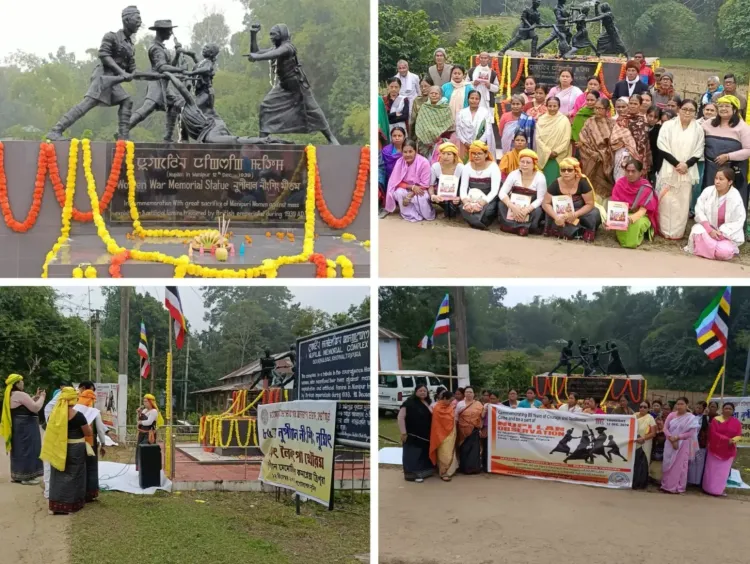Commemoration of Nupi Lal Day in Tripura, Assam, and Bangladesh; Honoring Manipuri Women Freedom Fighters

Agartala/Silchar, Dec 12 (NationPress) The momentous Nupi Lal (women’s war) day was celebrated in Tripura, Assam, and Bangladesh alongside Manipur to pay heartfelt tributes to the women freedom fighters who engaged in the struggle against colonial British actions during 1904 and 1939.
This iconic day marks the 85th Nupi (women) Lal (war) Numit (day) on Thursday.
Noted Manipuri intellectual Raj Kumar Tarunjit Singh stated that wherever the people of Manipur reside—whether in India or abroad—this day is observed annually with immense enthusiasm and solemn activities.
“A variety of events such as floral tributes and discussions were conducted on the occasion of Nupi Lal day in Khowai, Tripura, as well as in Cachar and Nagaon districts of Assam,” Singh informed the media in Agartala.
He mentioned that reports confirmed the day was also commemorated in the Sylhet and Moulvibazar districts of Bangladesh.
The Nupi Lal or Nupee Lal represents a significant struggle that erupted on December 12, 1939, opposing a highly exploitative socio-economic and political system enforced by the feudalistic-colonial rule in Manipur.
The main event of the day was held at the Nupee Lal Memorial complex and Ghanapriya Women’s College in Imphal.
Manipur Chief Minister N. Biren Singh and Forest, Environment, and Climate Change Minister Biswajit Singh addressed the gatherings, emphasizing the day’s significance.
During the Nupi Lal Ningshing Lamjel, a commemorative run honoring the historic Nupi Lal struggle, over 1500 women of various ages participated in Imphal.
The event started at the Nupi Lal Complex in Imphal and concluded at Singjamei, attracting participants from multiple regions of the state.
On December 12, 1939, numerous women stormed the state Durbar Office, demanding an immediate halt to rice exports, during which around 21 women sustained serious injuries from soldiers' bayonets and weapon butts.
The first women's agitation was ignited by Colonel Maxwell's actions in July 1904, when he attempted to reintroduce the abolished Lallup System, compelling men to provide free labor for 10 days after every 30 days.
Following the arson of two British officials' bungalows in 1904, Maxwell temporarily reinstated the Lallup System to facilitate their reconstruction.
This decision backfired as women united in protest against the injustice of forced labor.
After the Anglo-Manipur War of 1891, Manipur was under direct British rule until 1907, when administration was transferred to Raja Churachand Singh and his durbar.
Nevertheless, a British political agent was appointed to oversee the region's functioning, wielding significant power over the royal durbar, which had considerable consequences for Manipur's economy and trade.









